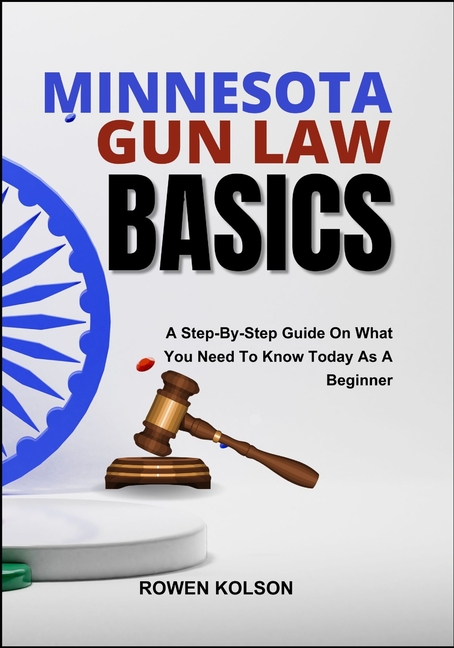Description
Minnesota's gun laws reflect a blend of traditional Second Amendment rights balanced with measures aimed at ensuring public safety. As one of the states in the U.S. with a rich history of gun ownership and hunting culture, Minnesota has developed a legal framework that both protects the rights of responsible gun owners and addresses concerns related to firearm violence.
Minnesota law governs a broad range of issues related to firearms, including the purchase, possession, carrying, and use of guns. The state's regulations cover various types of firearms, such as handguns, rifles, and shotguns, as well as accessories like magazines and silencers. These laws are shaped by a combination of state statutes, court decisions, and federal regulations.
At the core of Minnesota's gun laws is the right for individuals to keep and bear arms, consistent with the U.S. Constitution's Second Amendment. However, Minnesota enforces specific rules and restrictions designed to promote safe firearm use and prevent guns from falling into the hands of those deemed dangerous or unqualified. This includes background checks, licensing requirements, and prohibitions for certain categories of people, such as convicted felons or individuals with restraining orders.
One key component of Minnesota's regulatory scheme is its permit system for carrying firearms. Minnesota requires permits for carrying a pistol in public, either openly or concealed, with permits issued by local law enforcement authorities after thorough background checks and training requirements. The state issues two types of permits: a Permit to Carry a Pistol and a Permit to Carry a Handgun, which authorize legal concealed and open carry in most places, though some locations remain off-limits.
Minnesota also regulates firearm sales through licensed dealers and private transactions, requiring background checks to reduce illegal gun trafficking. Additionally, the state has enacted laws addressing firearm storage to prevent accidental shootings, especially involving children.
In recent years, debates around gun legislation in Minnesota have mirrored national conversations, with advocates calling for stricter controls to combat gun violence, while gun rights supporters emphasize the importance of personal protection and hunting traditions. Legislative efforts have included discussions on "red flag" laws, magazine capacity limits, and enhanced background checks, although the state currently does not have laws banning assault weapons or high-capacity magazines.
Moreover, Minnesota's legal landscape includes specific provisions related to the use of firearms in self-defense, commonly referred to as "Stand Your Ground" or "Castle Doctrine" principles, which provide legal protections for individuals who use firearms to defend themselves or their property under certain circumstances.
Understanding Minnesota's gun laws requires navigating a complex interplay of state and federal statutes, court rulings, and evolving social attitudes toward firearms. Whether for residents who wish to exercise their right to own and carry firearms responsibly, or for policymakers and advocates concerned with public safety, a thorough grasp of Minnesota's regulations is essential.
Minnesota law governs a broad range of issues related to firearms, including the purchase, possession, carrying, and use of guns. The state's regulations cover various types of firearms, such as handguns, rifles, and shotguns, as well as accessories like magazines and silencers. These laws are shaped by a combination of state statutes, court decisions, and federal regulations.
At the core of Minnesota's gun laws is the right for individuals to keep and bear arms, consistent with the U.S. Constitution's Second Amendment. However, Minnesota enforces specific rules and restrictions designed to promote safe firearm use and prevent guns from falling into the hands of those deemed dangerous or unqualified. This includes background checks, licensing requirements, and prohibitions for certain categories of people, such as convicted felons or individuals with restraining orders.
One key component of Minnesota's regulatory scheme is its permit system for carrying firearms. Minnesota requires permits for carrying a pistol in public, either openly or concealed, with permits issued by local law enforcement authorities after thorough background checks and training requirements. The state issues two types of permits: a Permit to Carry a Pistol and a Permit to Carry a Handgun, which authorize legal concealed and open carry in most places, though some locations remain off-limits.
Minnesota also regulates firearm sales through licensed dealers and private transactions, requiring background checks to reduce illegal gun trafficking. Additionally, the state has enacted laws addressing firearm storage to prevent accidental shootings, especially involving children.
In recent years, debates around gun legislation in Minnesota have mirrored national conversations, with advocates calling for stricter controls to combat gun violence, while gun rights supporters emphasize the importance of personal protection and hunting traditions. Legislative efforts have included discussions on "red flag" laws, magazine capacity limits, and enhanced background checks, although the state currently does not have laws banning assault weapons or high-capacity magazines.
Moreover, Minnesota's legal landscape includes specific provisions related to the use of firearms in self-defense, commonly referred to as "Stand Your Ground" or "Castle Doctrine" principles, which provide legal protections for individuals who use firearms to defend themselves or their property under certain circumstances.
Understanding Minnesota's gun laws requires navigating a complex interplay of state and federal statutes, court rulings, and evolving social attitudes toward firearms. Whether for residents who wish to exercise their right to own and carry firearms responsibly, or for policymakers and advocates concerned with public safety, a thorough grasp of Minnesota's regulations is essential.
Last updated on
Product Details
- Jun 20, 2025 Pub Date:
- 9798288975196 ISBN-10:
- 9798288975196 ISBN-13:
- English Language




